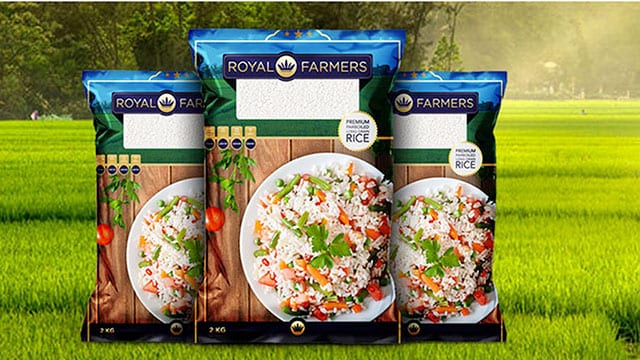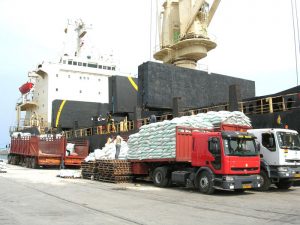Rice has become the second most important food staple after maize in Ghana.
Consumption keeps increasing as a result of population growth, urbanization, and changes in consumer preference.
The minister of food and agriculture puts Ghana’s rice demand at 1.1 to 1.3 metric tons per annum.
Ghanaians have over the years developed a strong appetite for imported rice due to its availability and attractive marketing as well as its highly polished and fragrant nature for the imported products.
But the price to the country is high.
It cost Ghana more than 1 billion dollars (almost two per cent of the country’s GDP) to import rice in 2018.
Slowly, attention has been drawn to “Made in Ghana” rice in recent times.
The argument is moving away from rice import to promoting locally grown rice.
Figures from the Ministry of Food and Agriculture (MoFA), shows Paddy rice output grew at around 10 percent per annum between 2008 and 2019, with an especially sharp increase of 25 percent in 2019.
An Oxford Business group article on Ghana’s rice sector reports that domestic outlook for domestic rice production remains favourable. Under the Ghana PFJ programme, rice cultivation in Ghana will increase form 239 thousand hectors currently to 260, thousand hectors by end of 2020.
The main consideration for our focal point today is whether to ban the importations of rice just as Nigeria did, or to allow local production to overtake rice import in a free, competitive market.
Public opinion for now is in favour of made in Ghana rice, with media houses and private entities initiating their own ‘Eat Made in Ghana rice” campaigns.
Patriotic sentiments have prompted local rice producers to finally pay attention local rice production.
Convener of the Ghana Rice Millers Association and CEO of DIGO farms Limited Yaw Adu Poku, argues that many imported rice were over three years and not fit for consumption. For this reason, there is a need to look within.
“Every house must start eating Ghana rice, our rice is aromatic; it is healthy because maximum is about one month old. The rice that is imported into the country, freshest is about three years old sprayed with insecticides, pesticides to preserve it so it is not as good as the rice we have in Ghana. So I will encourage everyone to start eating Ghana rice then the 2 billion dollars we are engaging to the international market will stay in the country to support we the farmers. “he said.
The problem starts with the fact that domestic production continues to fall short of demand with the share of import rice remaining above 50 percent.
Deputy Trades Minister, Robert Ahomka Lindsay had previously said rice importation alone takes 82 per cent of all imports into the country.
There are two main discussions playing out in relation to rice importation in Ghana, there is the food security and national security argument on one side, and the free trade argument on the other.
The government of Ghana has identified the importance of food security to the country with the introduction of the Planting for Food and Jobs. This is to ensure food security for the country.
Rice, the ministry say is essential in the drive to limit the country’s over dependence on export.
The Covid-19 pandemic has heightened this urgency.
The government intends, with the help of its flagship Planting for Food and Jobs programme, to increase the yield of farmers.
The Minister says with 50 per cent government subsidy on fertilisers for smallholder farmers, a farmer who was previously producing three bags of rice per acre will now be producing 10 bags.
The Deputy Minister of Food and Agriculture Hon. George Boahen Oduro, in an interview, revealed that the ministry has distributed about 11,300 metric tons of rice seedling to improve upon the bumper harvest witnessed in the northern sector last year.
“Last year we distributed about 6,000 seedlings to rice farmers in the country but this year we are giving 11,300 metric tons of rice seedling to improve upon the bumper harvest witnessed in the northern sector last year” he said.
To some rice producers, this is not enough. They are calling for a complete ban of rice importation.
But the Deputy Minister of Agric said since Ghana is part of the World Trade Organization, taking certain decisions may create a problem.
He argues that the competition in the space will help improve the quality of local rice. “ if you believe in yourself why should you ban. What we need right now is to focus on producing quality rice and also look at producing to meet the demand of the country and then start looking at exporting to the international market. If you ban others from bringing theirs in, how will you send yours to their market?” he asked.
The Minister added that the ban will not be necessary when Ghana’s domestic production overtakes imported rice.
But we can agree that despite these arguments the timing and attention is favourable for indigenous rice producing regions.
The government is committed to growing the sector.
The ministry of food and Agriculture has introduced machines (Planters, harvester, and new packaging methods) to increase production and also to rebrand local rice in the country.
Furthermore, paddy rice has been listed on the Ghana Commodities Exchange to give farmers access to warehousing, and markets for their produce.
The changing domestic appetite
In as much as some Ghanaian still have taste for imported rice and still doubt the Ghana’s capacity of growing quality local rice, experts from agriculture say the government must put in all the necessary measures in place to ensure food security and food sovereignty.
By: Mabel Faith Tannor






